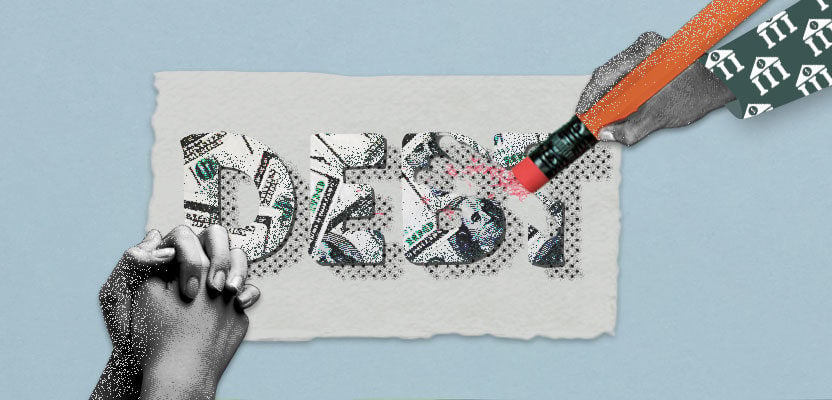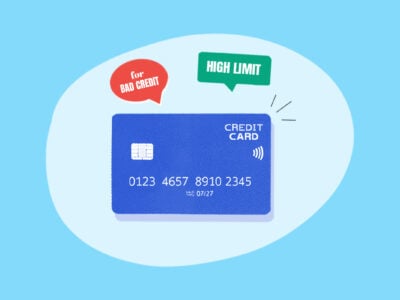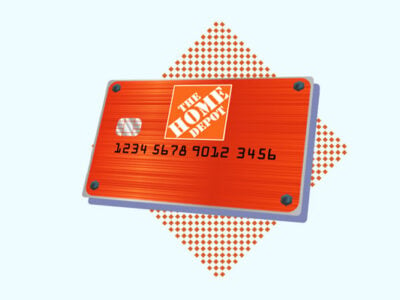Table of Contents
What is credit card debt forgiveness?
Broadly speaking, credit card debt forgiveness is any way of getting out of credit card debt without paying the full amount you owe.
When people talk about “debt forgiveness,” they usually mean one of two things:
Genuine debt forgiveness programs
When you enroll in a debt forgiveness program, it means that some or all of your debt is effectively canceled, and you no longer need to pay the money that you owed.
Genuine debt forgiveness programs are often offered by the government rather than by creditors. For example, people with student loan debt who are employed by the government or a not-for-profit organization can sometimes qualify for government-funded “public service loan forgiveness.” 1
These kinds of programs are fairly rare, and they’re not typically available for credit card debt. This means you should be very wary if anyone contacts you about a “new government program” to bail out personal credit card debt. Their credit card debt forgiveness program could be a scam. 2
You can find out more by doing a search online or contacting a debt counselor. However, there’s no guarantee you’ll qualify for any debt forgiveness programs, and if you do, they probably won’t apply to your credit card debt. You’ll probably need to explore your other options, such as debt settlement.
Debt settlement
Because true credit card debt forgiveness is so rare, when people use the term “debt forgiveness” in the context of credit cards, they’re usually referring to debt settlement.
Credit card debt settlement is when a credit card company decides that you don’t need to pay your credit card debts in full. This lets you clear them by making a partial repayment.
Can you get rid of credit card debt without paying?
No, you’ll usually have to pay at least part of your outstanding credit card debt. The amount you’ll have to repay will vary, but it’s only in the most extreme cases that you’ll be able to pay nothing. If you decide not to pay, creditors can sue you as long as it isn’t time-barred debt.
3 ways to get your credit card debt forgiven
There are three methods you should look into if you’re investigating how to get your credit card debt forgiven. They all have advantages and disadvantages.
1. Using a debt settlement company
If you don’t want to deal directly with your creditor or debt collector, you can hire a debt settlement company to negotiate with them on your behalf. Using them can remove some of the stress involved in arranging your own settlement.
However, debt settlement companies charge fees—often 20 to 25 percent (or more) of the settled debt. 3 They may also encourage you to stop sending payments for your credit card bills, which can damage your credit score and even expose you to lawsuits.
2. Attempting a DIY debt settlement
You can also go about settling credit card debt yourself. This means that you don’t have to pay fees to a debt settlement company, and you have more control over the process.
The downside of this approach is that you have to be extremely careful when negotiating. You don’t want to make a mistake and agree to repay money that you can’t afford, or give your creditors information that they can use against you. Even if everything goes well, this approach also takes time and can be stressful.
3. Receiving a settlement offer from your creditor
If a creditor or collection agency contacts you to offer a settlement, it’s a great opportunity to negotiate your credit card debt. Use their offer as a starting point and try to talk them down.
What are the consequences of credit card debt forgiveness?
There are two major consequences of credit card debt forgiveness (i.e., debt settlement).
- Your credit score may suffer: Settling a debt will hurt your credit score by causing a negative mark to appear on your credit report. Additionally, the settlement process sometimes involves missing credit card payments. Missing a payment can cost you 100 points or more from your credit score in some situations. 4
- You can be taxed on the forgiven debt: Forgiven debt often counts as taxable income. You may have to pay tax on the money that your creditors write off. 5
When should you consider credit card debt forgiveness?
In general, you should consider credit card debt forgiveness when you’re deep in debt and have no realistic prospect of paying the full amount off. If your circumstances aren’t quite that bad yet, you’re better off pursuing other options (described below) that won’t damage your credit score.
You have a better shot of successfully negotiating a debt settlement if most of the following applies to you:
You’ve fallen a long way behind on your payments
Once you’ve stopped repaying your debts, there’s an incentive for creditors to accept a settlement offer from you. If they have to choose between being guaranteed a smaller repayment versus chasing after larger sums of money that you might never be able to repay, they’ll often go for the former option.
Your creditor is about to charge off your account
If your creditor has given up trying to get you to repay your debt, they may decide to proceed with a charge-off (which leaves an entry on your credit report indicating that they no longer expect you to repay them). When they do this, your unpaid debt becomes lost revenue for them. Their only option is to sell the debt to a debt collection agency at a loss.
At this point, your credit card company is more likely to accept a settlement and forgive part of your debt.
What if my debt has already been charged off and sold?
If a collection company already owns your debt, it’s even easier to negotiate a debt settlement. Collection companies purchase debts for a small fraction of their original value—just 4% on average. 6
Even if they settle with you for less than the debt’s original value, they’ll still make a profit. This means that they’re more likely to be open to negotiation.
Are there alternatives to credit card debt forgiveness?
There are several alternatives to credit card forgiveness if you need help getting out of credit card debt.
Your options include:
Hardship assistance programs
If you’re struggling with your bills because of financial hardship, you should contact your card issuer. Lenders typically offer hardship assistance programs (also called “accommodations”). 3
To be eligible for these programs, you have to reach out to your lender proactively—they won’t usually publicize them or approach you on their own.
Your lender may be able to help you to: 7 8
- Get late fees waived or refunded
- Reduce or delay your credit card payments
- Reduce the amount of interest you have to pay
- Avoid negative items on your credit report (if you enroll before you miss any payments)
- Create a long-term plan that lets you pay back your debt over a set period at a lower interest rate
Debt management plans
A debt management plan (DMP) is one of the tools that a nonprofit credit counseling agency may offer to help you get on top of your debt.
With a DMP, you make monthly payments to the agency. They’ll then use your money to pay back your credit card debts according to a payment schedule that your counselor creates with you and your creditors.
They may even be able to negotiate with your creditors to lower your interest rates or waive certain fees. It’s a good idea to confirm this with them before you enroll in the DMP, though.
Don’t confuse debt management with debt settlement.
Although the terms sound similar, there are many differences between debt management and debt settlement. In contrast to debt settlement, when you enroll in a DMP, you’re committing to eventually paying your debts back in full. This is why debt management (unlike settlement) doesn’t hurt your credit score.
Credit card debt consolidation
Debt consolidation means combining multiple debts into one, which makes them easier to pay back. Doing this has two major advantages:
- You’ll only have to think about one payment per month instead of worrying about lots of payments to different creditors.
- You might be able to get a lower interest rate on the new debt than on the ones you’re currently paying.
You can consolidate your debts by transferring them to a credit card. This is known as a “balance transfer.” This can be a good option because many credit card issuers will allow you to pay a 0% interest rate on your new card for a set period after you sign up. However, you may have to pay an initial balance transfer fee. 9
Some lenders also offer special installment loans designed for this purpose. These are called debt consolidation loans. As with credit card balance transfers, you have to keep an eye on their interest rates. The Consumer Financial Protection Bureau notes that many debt consolidation loans have low initial interest rates that may increase after a while. [10
Debt consolidation loans can also have hidden fees (such as “origination fees,” which you sometimes have to pay when you take out the loan). Before pursuing debt consolidation, sit down with a calculator and run the numbers to make sure that you’ll actually save money in the long run.
Bankruptcy
You can get your credit card debt discharged through bankruptcy. Forgiveness and discharge are different, but they effectively do the same thing—in both cases, your debts will be cleared and you won’t have to pay them anymore. [11
Not everyone is eligible for bankruptcy, though, and it has many downsides. For example, people like potential landlords and employers will find out about it if they run a background check on you. It can also ruin your credit score, so if you can get out of debt without declaring bankruptcy, it’s best to do so. 12
However, in certain situations, bankruptcy can offer a fresh start. It might be an appropriate option for you if:
- You don’t have enough money to settle your debts, or your creditors aren’t willing to negotiate
- Your income isn’t sufficient to pay off your debts in a debt management plan (or your debts aren’t eligible)
- Declaring bankruptcy helps you avoid the consequences of nonpayment, such as lawsuits and further damage to your credit score
Bankruptcy is a last resort, but if you’re really struggling with credit card debt and have no realistic chance of paying it off, it might be your best option.
Takeaway: Credit card debt forgiveness is very rare, but you can pursue debt settlement instead
- In the context of credit card debt, “debt forgiveness” usually refers to debt settlement.
- When you pursue debt settlement, you offer to repay a portion of your debt and the rest is forgiven.
- Debt settlement might be a suitable option if you’ve missed a lot of credit card payments, especially if your debt has been handed over to a collection agency.
- Debt settlement often has consequences for your credit score, and it can also affect your tax liability.
- There are alternatives to credit card debt forgiveness that may be more suitable for your situation. These include debt consolidation, debt management plans, and hardship assistance programs.
- Bankruptcy is an extreme option, but one that you can pursue if you’re really struggling with your credit card debt.







